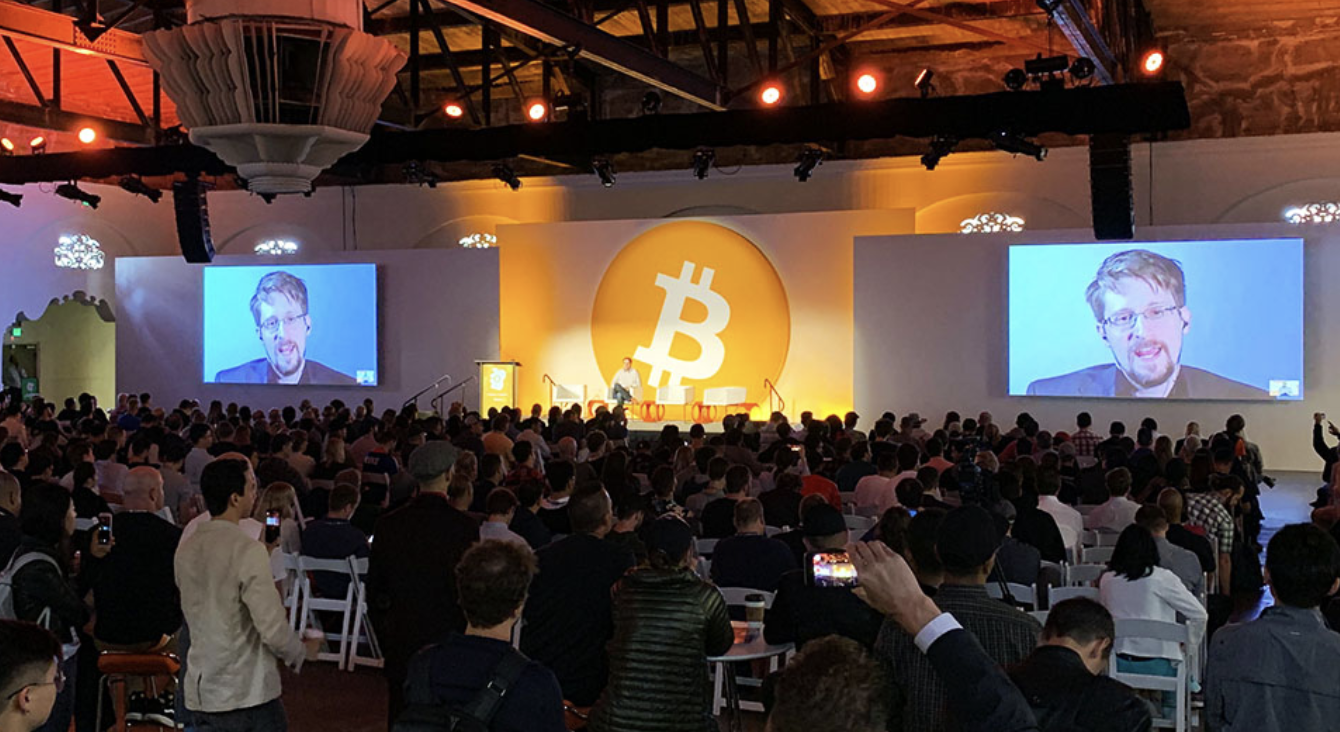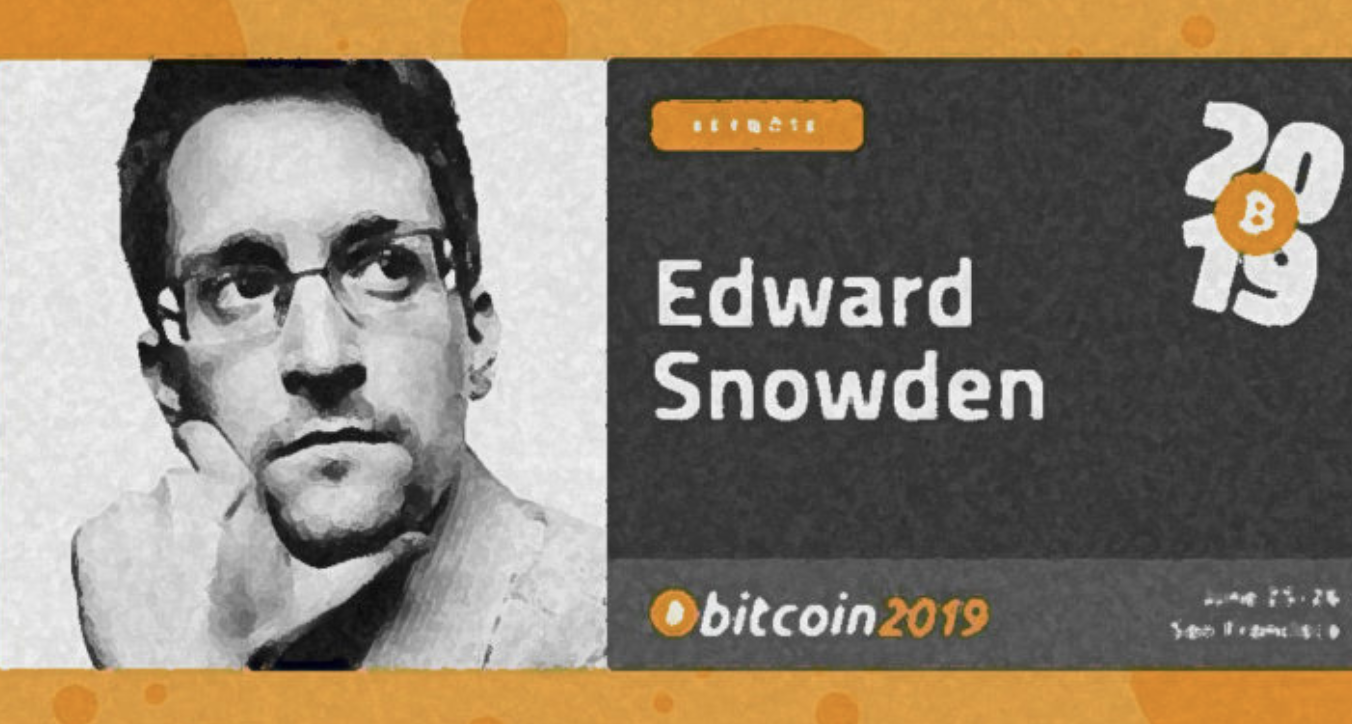Snowden suddenly "shows" at Bitcoin 2019, talks to David Bailey
After Snowden "appears", the atmosphere at the scene is pushed to a climax, and the applause is thundering.
BlockBeats news, at the Bitcoin 2019 conference in New York, USA, Edward Snowden suddenly appeared in the video, this is the first time Snowden appeared after the arrest of Wikipedia founder Juliette Assange. In an interview with David Bailey, CEO of BTC Media Group, Snowden talked about his views on bitcoin, especially the importance of privacy.
In 2013, Snowden's exposure to the US National Security Agency's massive surveillance of US citizens shocked the world, which is a sign of cypherpunk and the encryption community. His commitment to privacy and personal freedom, and his swearing to defend these principles against the government, also reflects why Bitcoin is so attractive to most of us.

- Digital asset management chaos: institutional chaos recovery
- Facebook Libra in-depth analysis report
- The world is financial, but ultimately it is technology – blockchain or the ultimate weapon of technology to defeat finance
"You have a lot of fans here," Bailey said.
"Oh, yeah, but who knows?" Snowden replied sarcastically.
Of course, Snowden could not attend this meeting in person. Due to the information disclosure incident in 2013, he still suffered "anti-state crimes" due to political exile. Snowden’s move broke the seal of privacy in the information age. He continued this topic in his keynote speech, especially since it covered Bitcoin, his vision and the future of civil liberties in this era of surveillance.
The role of privacy
"What is the role of privacy in society? Why do we need it?" Bailey asked.
Snowden mentioned ShapeShift in response. He believes that under the influence of government officials, the trading platform has begun to become an experiment of liberal ideals, and anonymous transactions are seamlessly conducted through passwords. Like everyone else before and after, ShapeShift implemented KYC to prevent money laundering.
On the use of KYC, Snowden believes that "this is the status quo of the industry, and this is how the banking industry works."
He continues to compare freedom of information with the freedom of trading. "You can say anything you want to say, even the worst case is that you will leave YouTube, Twitter. Although this will have some degree of interference, it From private companies, not the government," he said.
However, money is different. It is not as free as information, because banks as private companies and governments have the final say on your funds. Your account can be frozen when you are subpoenaed or when the banker is in trouble.
"For me, this is the most interesting place for Bitcoin. Bitcoin is free. I am not saying that because of the price increase," Snowden said. "I mean it is the first free money, you It can be exchanged and interacted. When I think about privacy and freedom, what is freedom? I am free from licensing. On Bitcoin, we can experiment, we can participate, we can try. We may even fail!
"The right to freedom without harming others. Of course, this is also the basis of all rights. When you talk about due process, the right to a fair trial, freedom of speech, freedom of religion, in short, whatever it is, why do we have these rights? Because they are written in our bodies. Privacy means you belong to you, not to society."
The era of large-scale digital surveillance
In the technological age, large-scale digital surveillance is rapidly and gradually freeing us from freedom. Snowden warned that freedom is not only smothered by the government and technology companies, the users themselves are accomplices to give up their privacy.
"In the past, if the government wanted to pay attention to you, they would organize a team to do it. But now, all of this monitoring happens on the devices we use ourselves. We are creating a permanent record of our private lives. Once we do this Privacy is no longer an individual. Freedom is no longer the natural state of things. Now it has become a nervous point in the current society."
This tension occurs between the government, Facebook and banks around the world, which now have user privacy, including data and private information exchanged by Internet users. Although Snowden said the government usually does not use this information unless it is permitted by law, because it is expensive and time consuming to process it. But advances in artificial intelligence and machine learning will make intrusion of basic private information more feasible.
He went on to say that maintaining privacy is correct. Not only because the government is monitoring us, but because they choose to do so without a public consensus.
"2013 is not about surveillance. Surveillance is a mechanism for discussing conversations that affect us all. Even in a free and open society, governments are becoming more accustomed to making decisions without a democratic process. There was no vote on these systems and the court did not rule whether they were unconstitutional."
These unilateral decisions are not undemocratic but threaten the interests of the minority who are deprived of their rights (the minority here is the general public).
"Without privacy, we have no power. Because privacy gives us agents. Without privacy, our other rights have no meaning. What is rights? Rights make a kind of protection, although not for most people, because most people don't need Protection. Protecting a minority from the rights of the majority. "Snowden sums up his answer to Bailey's first question.
All of these answers, Snowden called it "a lengthy answer."

How does the government attack Bitcoin?
"Anyone who works in the field of encryption in the organization will tell you that the first thing they pursue is privacy," he mentioned ShapeShift again. "Lack of privacy is a threat to the use of Bitcoin. Privacy should be the only protection Bitcoin has for users, but this protection is waning."
The government will focus on these platforms and undermine user privacy. This is the main threat to Bitcoin, which Snowden claims is a threat that can attack something worth protecting because "privacy is not hiding something; it is to protect something."
So how do you protect it? By encouraging the use of Bitcoin's peer-to-peer transfers, people can circumvent statutory litigation or build technology that allows users to prove that their funding sources exceed the last transaction. If we rely on a centralized, state-regulated platform, then the funds will be blacklisted.
There is also a third option: lobbying so that we can have a place when drafting laws.
"We don't see it in the field of encryption right now. Given the number of new millionaires and billionaires we have, this is actually unforgivable. You need to start lobbying for more favorable jurisdictions.
"The point is that they don't interfere with your business. It doesn't matter if you trade in the US, Germany or anywhere, unless you work in the previous model, in which you want to build the next US bank, That is, the next first country. But the world does not need the first country. It needs the first post-country and eliminates the new country defined by the state."
It was a round of applause, and Snowden responded that companies like ShapeShift became complacent and warned regulators that "this is why we can't have good things."
Quality supervision is not about public safety, but about rights
Bailey then asked about the use of Bitcoin in ransomware attacks, especially when the shadow agent stole and sold Snowden's [NSA] Digital Weapons Library called Bitcoin.
Although the attack must have been an insult to the US government, Snowden believes it exposes weaknesses in monitoring the country and the failure of a single entity to protect the most important assets.
"The National Security Agency created these things and they couldn't control them," he said. Moreover, even if an attacker uses a bitcoin trading tool, the authorities will never be able to track their trading path.
"You can have the most powerful monitoring technology in the world, but it will only solve a part of the problem and not solve all the problems." He strongly stressed, "It can't even track the hackers who steal it."
"Some people think that hidden middlemen are not caught because large-scale surveillance is not enough. But large-scale surveillance does not involve public safety. It only relates to power. This means that large-scale surveillance is not directly related to solving our problems, sometimes it is reversed. It will make things worse."
We don't have to compromise on the status quo
Snowden’s conversation ended with the same theme: we don’t have to succumb to this situation. "We can live in a world where privacy is a priority, and maintaining privacy requires a right," he simply sums up.
For Snowden, creating a network worth hundreds of billions of dollars, and Nakamoto, who did not reveal his identity, proved the fact: "If you are careful enough, and more than those who try to use the system to hurt you." Knowing the application and value of technology, you can take advantage of it."
Bailey asked Bergen whether he held Bitcoin as the last question in the conversation. The former whistleblower replied cautiously: "As a privacy advocate, I refuse to hold cryptocurrency."
But he also mentioned his past experience of leaking secrets: the encrypted chat software he used to provide information to Glenn Greenwald and Guardian reporters who reported on the abuse of privacy by the National Security Agency was purchased in Bitcoin.
Therefore, for Snowden, Bitcoin gave him the freedom to trade, which in turn allowed him to freely share information he thought should be entitled to be acquired by people. Anti-censorship assets are used to disseminate information that resists surveillance. At the end of the conversation, people stood up and applauded him enthusiastically.
Original title: " Snowden: “Mass Surveillance Isn't About Public Safety. It's About Power. ”
Author: Corlin Harper
Translator: Lupin, 0x29, Fyj
Source: block rhythm
We will continue to update Blocking; if you have any questions or suggestions, please contact us!
Was this article helpful?
93 out of 132 found this helpful
Related articles
- PricewaterhouseCoopers announces 8 cryptocurrency audit services, both BTC and ETH
- Institution Fomoing, whales enter, collect licenses, summon dragons
- G20 Summit Meeting V20 Preview: Digital Asset Service Proposal Extends Effective Date of FATF Standard
- Jinan, Shandong: When the blockchain meets government service, it takes only one hour for the company to start.
- Institutions are also suffering from "missing phobias". Who buys Bitcoin in large quantities?
- Dfuse received $3.5 million in seed round financing, led by Multicoin Capital and Intel Capital
- Talking about the governance of encryption protocol: making good use of the power of evolution to achieve network effect






